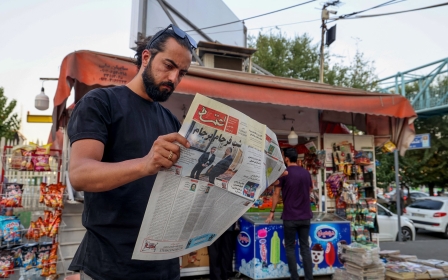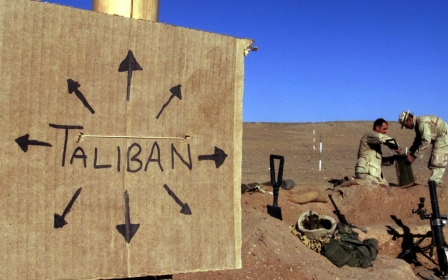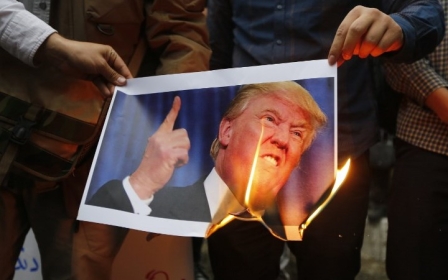Was Trump's obsession with attacking Iran his undoing?

According to reports last month, federal prosecutors obtained "a recording of a meeting in the summer of 2021, in which former US President Donald Trump acknowledges that he kept a classified Pentagon document about a possible attack on Iran".
Currently, this recording is a major piece of incriminating evidence that US federal authorities are using for the case they are building against Trump after searching his Mar-a-Lago estate in Palm Beach, Florida.
The legal and political ramifications of this and countless other alleged criminal activities of the former US president remain to be seen. Will Trump end up in jail or will he be sent once again to the Oval Office for a second term?
As The New York Times puts it: "The potential prison sentences for Mr Trump add up to as much as 420 years, even though conviction almost never results in the maximum sentence. But this indictment confronts the country with the harrowing prospect of a former president facing years behind bars, even as he runs to regain the White House."
Trump is neither the first nor the only US president to have had legal woes. Presidents Bill Clinton and Richard Nixon had their own share of such legal troubles, as did President Warren Harding back in the 1920s. The US legal system, however, has not been the only mechanism for bringing criminal charges against US presidents.
New MEE newsletter: Jerusalem Dispatch
Sign up to get the latest insights and analysis on Israel-Palestine, alongside Turkey Unpacked and other MEE newsletters
Because of their warmongering, Presidents Bush and Nixon, for example, always faced potential charges around the world as war criminals. In 2015, a court in Malaysia "charged, tried and convicted President Bush, [Vice President Dick] Cheney, Defense Secretary Donald Rumsfeld and several of their legal advisers with war crimes of torture and inhumane treatment".
Obsessive hatred of Muslims
Today, however, we are witnesses to a very potent case of alleged criminal behaviour in Trump, whom millions of Americans have twice in a row chosen as their president, once successfully and once not.
The document at the centre of Trump's legal predicament is the plan for a military strike against Iran.
In the same editorial piece, The New York Times informs its readers that the document at the centre of Trump's legal predicament is the plan for a military strike against Iran. "Isn't it amazing?" the disgraced former president is reported to have boasted to someone after showing him the document.
But this incident raises several questions: what was a detailed military plan to invade Iran doing at Trump's private residence when he was no longer the president? Is the man delusional and refusing to accept the fact that he lost the election, hoarding boxes upon boxes of documents to which only a US president should have access?
We now have a new report that says Trump has a psychopathological attachment to his boxes: "The former president has long stowed papers and odds and ends in cartons that he liked to keep close. His aides have called it the 'beautiful mind' material."
What in the world is "beautiful mind" material? It is a reference to "the title of a book and movie depicting the life of John F. Nash Jr., the mathematician with schizophrenia played in the film by Russell Crowe, who covered his office with newspaper clippings, believing they held a Russian code he needed to crack".
But what should then be done with the millions of Americans who believe as he does, including the almost entire Republican Party establishment?
One revealing clue into at least one aspect of Trump's possible criminal behaviour is his diabolical hatred of Muslims. His hateful attitude towards Muslims in general and Iran in particular is of course a matter of detailed records.
One, of course, needs to understand Trump's pathological disposition towards Iran in multiple contexts, not the least of which is his psychotic hatred of Muslims evident in his infamous Muslim ban in which he sought to limit or even eliminate Muslim immigration to the United States. Muslim countries are part of what Trump infamously referred to as "shithole countries".
Iran in his crosshairs
Greatly appeasing his Zionist handlers and constituencies, just over a year after he took office, Trump withdrew from the Iran nuclear deal, just to spite the signature foreign policy achievement of his predecessor, Barack Obama. Trump "isolat[ed] the United States from its western allies and sow[ed] uncertainty before a risky nuclear negotiation with North Korea" as The New York Times reported at the time.
Then came the targeted assassination of Iranian major-general Qassem Soleimani, who was murdered by a US attack drone near the Baghdad International Airport in Iraq in 2020.
"Last night, at my direction, the United States military successfully executed a flawless precision strike that killed the number-one terrorist anywhere in the world, Qassem Soleimani," he bragged following the Iranian general's murder.
"Soleimani was plotting imminent and sinister attacks on American diplomats and military personnel, but we caught him in the act and terminated him."
There might be people inclined to believe Trump's words except that the last time anyone cared to count, he had made a total of "30,573 false or misleading claims over four years".
Then came Trump's threats to destroy Iranian cultural sites. "In a series of tweets, Trump wrote that 'if Iran strikes any Americans, or American assets' - the US has targeted 52 Iranian sites - 'some at a very high level & important to Iran & the Iranian culture, and those targets, and Iran itself, WILL BE HIT VERY FAST AND VERY HARD'."
Unfortunately, millions of Americans absolutely love and cherish such thuggeries and rush either to vote for him or else dismantle the citadels of American democracy if they dared to question his demagoguery. As an individual, Trump is not a threat to world peace and civilisation as we know it. But millions upon millions of Americans who love, cherish and adore him may be.
As an individual, Trump is not a threat to world peace and civilisation as we know it. But millions upon millions of Americans who love, cherish and adore him may be
Now comes the revelation that Trump had, in fact, ordered a full plan to invade Iran militarily, and when he did not have the time to implement it before he was booted from the White House, he took the plans home with him in his "beautiful mind" boxes.
Yet even as an allusion to a book or a movie, Trump does not have a beautiful mind. His plans to invade Iran on the model of his predecessors' invasions of Afghanistan and Iraq may have so far not materialised and remained in his "beautiful mind" box - or they may, indeed, be his final undoing and land him in jail.
But the world is not going to hold its breath for such a just outcome. The deeper problem lies in the vast numbers of American voters who would rush to put him in the White House to do as he pleases one more time.
The views expressed in this article belong to the author and do not necessarily reflect the editorial policy of Middle East Eye.
Middle East Eye delivers independent and unrivalled coverage and analysis of the Middle East, North Africa and beyond. To learn more about republishing this content and the associated fees, please fill out this form. More about MEE can be found here.






